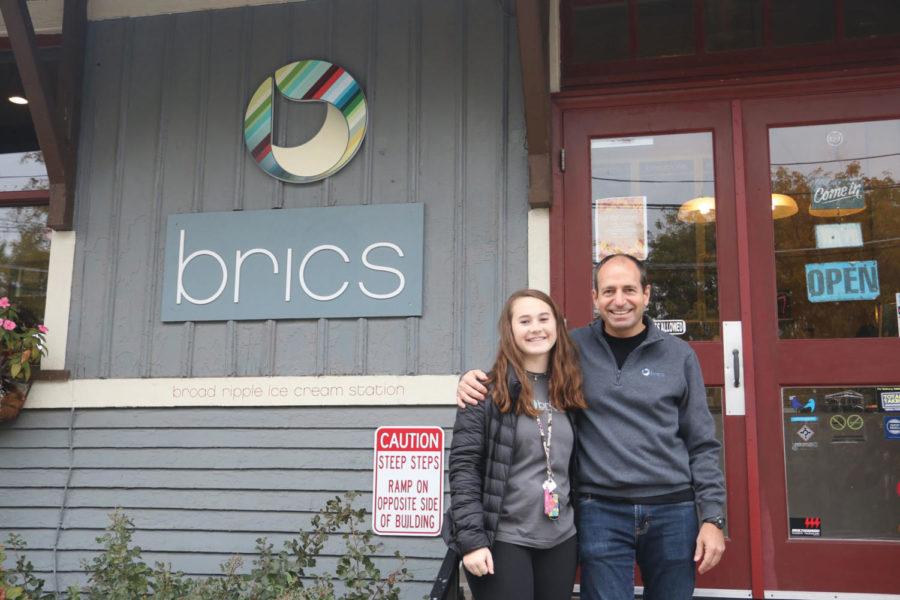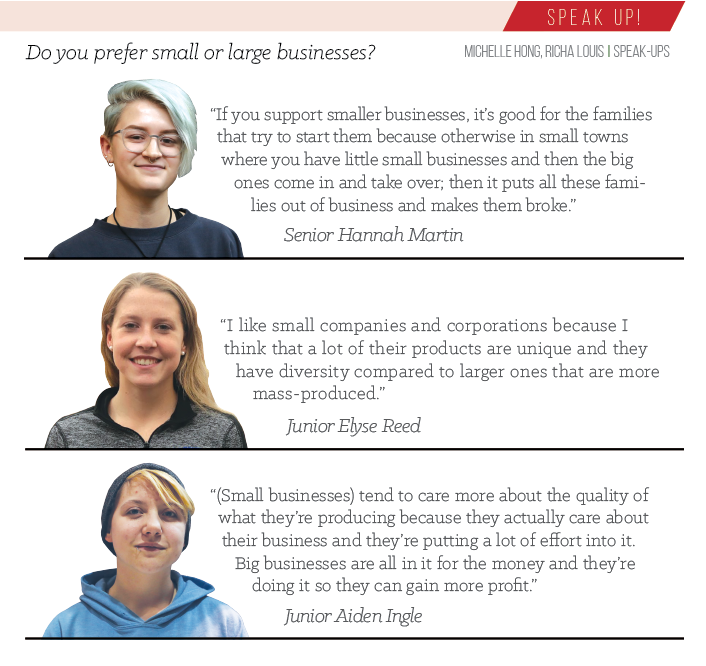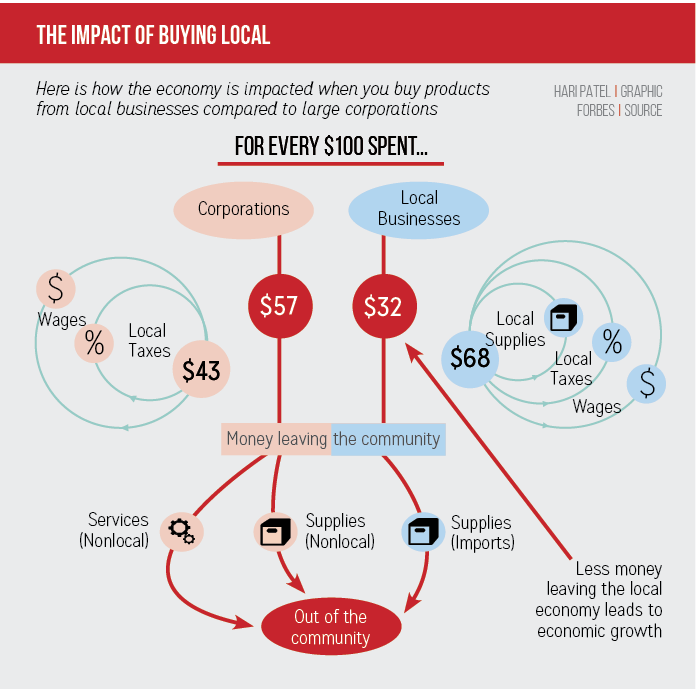Your donation will support the student journalists of Carmel High School - IN. Your contribution will allow us to purchase equipment and cover our annual website hosting costs.
I Scream, You Scream, We All Scream For Local Businesses: As Nov. 25 marks Small Business Saturday, CHS students reflect on how small businesses persevere in a large-business world
November 17, 2017
Seven years ago, a former Broad Ripple train station became the local ice cream store Broad Ripple Ice Cream Station (BRICS), a well-loved business that has blossomed in the past few years. For junior Rachel Morrison, the store means a lot. Morrison boasts the title not only of a BRICS former employee, but also of the niece of the founder and co-owner David Vonnegut-Gabovitch. To Morrison, BRICS is more than a local ice cream shop. It holds precious family memories of annual trips to Lake Michigan, memories that inspired Vonnegut-Gabovitch to start his business.
Morrison said, “There was an ice cream store there. It’s called Oinks—it’s still there—and we would always go there. We all loved the ice cream, so my uncle thought it’d be a cool idea to have that type of ice cream, Sherman’s Ice Cream, made in South Haven Michigan, down here in Indy so we would have it.”
Gabovitch said he started pursuing the business in 2006 up until BRICS’ opening in 2010. As BRICS first started out, Gabovitch said the results surprised him: BRICS separated itself from the crowd of other businesses. He said its location on the Monon Trail was a main contributor to its initial success.
However, Morrison said the store’s connections with the family was also strengthened through excitement and encouragement.
Just as BRICS was breaking ground seven years ago, Jenny Qiu’s Cold Stone Creamery in Hamilton Town Center celebrated its two-year anniversary. Qiu said her process was much different; Cold Stone demanded that the location meet extensive requirements to be able to construct a building there. Corporate regulations led to a 16-month process to set a new Cold Stone location.

Rachel Morrison, former BRICS employee and junior, stands with her uncle, David Vonnegut-Gabovitch, in front of his ice cream store, BRICS. Morrison said she likes having an ice cream store in the family.
“The reason I tried to open the store is I met some friend at a party,” Qiu said. “They own a Cold Stone, and they said, ‘You should try it.’ We did a lot of research around the area, like the city, the family income, how many footprints and how much traffic is going to come to this area.”
Nov. 25 marks Small Business Saturday, a day set aside in conjunction with Black Friday, the day after Thanksgiving, to promote sales at local shops. The historic clash of big versus small businesses, and in this case the difference between a family-owned business like BRICS and a chain business like Cold Stone, seems like an long-standing struggle for economic coexistence. However, according to business teacher Robert Browning, worries about big-corporation dominance were thrown into the spotlight as recently as the 1980s and 90s.
“I don’t know if (big businesses have) completely edged (small businesses) out yet, but it’s certainly trending that way,” Browning said. “I think it’s (because of) two main things: one is logistics, which is like the supply chain management because now they’re able to make products, transport it across the country and do it timely and efficiently. The other thing is the increase in technology; I think that’s helped too. The bigger businesses, they can get a hand on technology better, and they can do it more cost effectively.”
For his part, according to Gabovitch, investing in technology is one of the pillars of ensuring success in his business. He said having a separate full-time job allows him to grow the shop instead.
Gabovitch said, “I don’t have a real profit motive, so I’m willing to reinvest the money. We add it on the deck, we buy the equipment that we need, we try a lot of things, some work, some don’t, (but) we spend the money trying them.”
Beyond technology, Browning said the economic benefits of small businesses have value to be considered as well; those benefits include job security within the community and stabilizing the local economy.
“The problem with the larger businesses coming into a city is they may get taken over by some company that’s based out of a country that’s outside the United States,” Browning said. “They decide that they’re going to close the store or the factory in your town, and that’s not going to happen with the smaller business.”

Browning said local government plays an integral role in reliable support for the growth and survival of small businesses and could possibly encourage the citizens to shift their purse to the small side.
“You’re supporting your own town and you’re also supporting a greater chance of jobs staying, and the local flavor staying in your town and not being subject to a takeover where they’re going to remove the store or business or the manufacturing plant,” Browning said.
Moreover, Browning said the impact of small businesses on the national economy is significant.
“(Looking) statistically, small businesses make up a large portion of the (gross national product) and the money that’s being generated and output and job production in the country, and so small businesses are there, but it’s just getting smaller. So I think that because small business production is a decent part of the macroeconomics (of) the national economy, that you do see it get impacted.”
Still, Browning said there is also merit to big business entering the local economy. He said local governments see the possibility of an immediate spike in their town’s economic capacity and are automatically attracted to pulling in large business.
“One thing that the big companies do when they come in (is) they can produce a lot of jobs. That can be helpful; it’s just that the jobs can be uncertain because of the uncertainty in the international business. The large company that has come into a particular city may be an American company one year and the next year purchased by a foreign entity. And then that takeover company may have all different ideas strategically, so they may lose the business,” Browning said.
However, when comparing how a community interacts with two competitors in their area, Browning, Gabovitch and Qiu all said the ambience and “feel” is what makes a shop a landmark.
Morrison said BRICS has cemented its place in the community’s routine and hearts. Its secret: personalized service.
“My uncle really wanted it to be a place where people would come and hang out more than just to get ice cream,” Morrison said. “He really wanted it to be something that was like an experience for the customer rather than just a place to buy something. People will come off the Monon and sit there and people watch, which isn’t something you would usually get from a commercial business. It’s more of a homey type of feel.”
Gabovitch said his motivation for starting the BRICS—giving people a comfortable and welcoming shop to spend time in—leads into the style in which the shop is run. He said instead of using their profits to stuff his own wallet, he reinvests not just in the shop, but also in the community. He said the effect of his store on a person’s life gives him great satisfaction.
One example of this is an anecdote of a woman coming in to buy 4 Birds Bakery’s cookies, sold in BRICS, for her wedding anniversary. The cookies held significant meaning to the woman, Gabovitch said, because her husband was deployed at the time. However, when the her dog mistakenly ate the cookies, BRICS showed compassion to her like only a small business could.
Gabovitch said, “She came back and she was crying; her face was puffy and (a worker) said, ‘What’s wrong?’ She told him the whole story, so he gave her the cookies free. It’s things like that, you know, we try and empower the employees to do the right thing, and if someone drops their ice cream, they get ice cream. Somebody doesn’t like the flavor they have, we’ll replace it. We try and be good stewards of an ice cream store.”
Morrison said BRICS also lends a hand to other local organizations and tries to be environmentally friendly. BRICS’ effort help out the community reveals why its founders and employees believe the younger generation should support local, small businesses.
“I think it’s really important to help out these local businesses that are trying to do their best to compete in these larger markets when they don’t have as many resources as larger businesses do,” Morrison said. “Just to support the culture of an area so it makes the city a little different than other cities. I think that people like going to small businesses because it’s different, but I think that it’s also hard especially when smaller businesses, there’s not as many.”
Browning said small businesses have continued to be a steady presence in the economy because they bring a personal touch that makes people accept them not just as another establishment, but also as a part of their lives.

“I think there can be a shift in the trends so the pendulum starts to swing back a little bit more as people become more interested in personalized service (and a) sense of community rather than cold, impersonal sales,” Browning said. “And as long as the small businesses can tap into that—which I think there is a little trend toward the people (wanting) to have that connection—as long as they can keep their prices competitive, I think people might be willing to pay a little bit more.”
Morrison said the local ice cream flavor, as established by BRICS, is supporting those around them. Gabovitch added that not-for-profits, such as Indiana Recycling Coalition and Exodus Refugee Immigration, have been long-time partners with the shop.
Morrison said, “My uncle is really supportive of different organizations in the area, not-for-profit organizations. They do a lot of give-back nights and that’s something that commercial businesses aren’t as available to be able to do because they have to go through the corporate.”
Even so, larger chain businesses aren’t inflexible. Qiu said at Cold Stone, she also tries to contribute to the community. She said she annually works with Make-A-Wish Foundation. Although the franchise itself may be impersonal, Qiu said her connections to her customers bring her store a specific personality unparalleled by any other in her vicinity.
One of her customers, veteran Robert Harter, has been a loyal Cold Stone customer for nine years. Qiu said she knows his order by heart: a dark-chocolate milkshake, every time.
She said she employs small-business tactics like giving out free ice cream as Christmas presents to loyal families and decorating their cakes above and beyond.
Browning said this makes for a tricky balance for store owners. “The small business and the large business (sides both) have their benefits to a community and individuals, and both sides have their detriments or cons,” he said. “The sad part of it is, at the end of the day, real people get affected, and then that flows out to families. How you ultimately fix that is probably more to political government level, and that’s another whole set of issues.”

